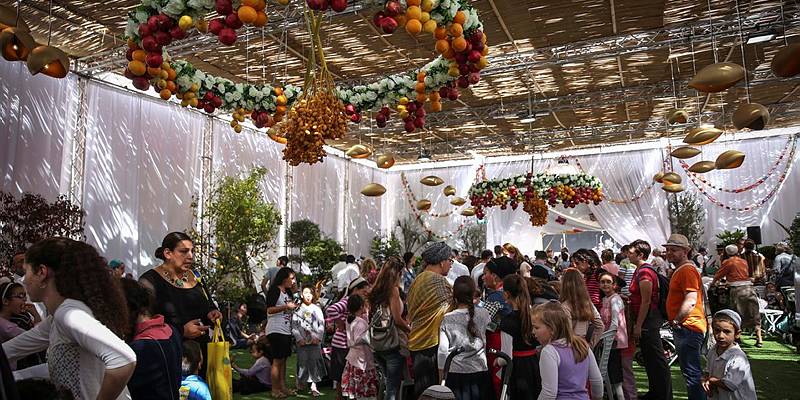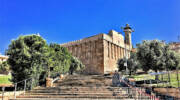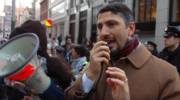Jacob, along with the holiday of Sukkot, teaches us that we must value all our possessions as well as recognize that they are all from God.
By Rabbi Ari Enkin, Rabbinic Director, United with Israel
It is taught that the each of the Torah’s three festivals correspond to one of the Patriarchs of the Jewish people – Abraham, Isaac and Jacob. The festival of Sukkot is connected to Jacob. How so?
Although Esav had sold his birthright to his younger brother, Jacob, Esav was furious when he heard that Jacob had indeed received the special blessing for the firstborn from their father.
Sometime later, when Jacob was traveling to meet Esav following more than a decade of separation, Jacob left his family to go and retrieve some belongings that he had forgotten. While alone, we are told, Esav’s “guardian angel” assaulted Jacob, wrestling with him all night long. Although Jacob was ultimately victorious, the angel succeeded in dislocating Jacob’s thigh (which is why we are not permitted to eat the back end of animals). Shortly thereafter, Jacob and Esav met, made amends, and then went their separate ways.
The Torah then tells us (Genesis 33:17): “And Jacob journeyed to Sukkot, and built himself a house and made booths for his cattle; therefore the name of the place is called Sukkot.” It is Jacob’s construction of booths – in Hebrew, Sukkot – for his cattle which is the link to the holiday bearing the same name.
Could it be that Jacob is known as the patriarch of the holiday of Sukkot merely because he built his animals a booth. I would think there must be a stronger connection.
As mentioned, Jacob went to retrieve some forgotten possessions when attacked by Esav’s angel. The Talmud describes Jacob’s desire to retrieve his possessions as follows: “Said Rabbi Eleazar: Jacob went back for the sake of some small jars. We learn from here that to the righteous their money is dearer than their body. And why are they so fond of their possessions? Because they do not stretch out their hands to robbery.”
What does this mean that the righteous “do not stretch out their hands to robbery.”?
There was once a righteous man who was so poor that he didn’t even own a decent cup and basin with which to wash his hands as ritually required. One night, he dreamed that God was going to bless him with a cup and basin, and so it was. Upon awakening in the morning, he found beside him the exact basin and cup that he saw in his dream. This was clearly a gift from God, and he treasured it greatly.
The man’s fortune soon changed. He became wealthy, and had his home completely expanded and renovated. Upon completion of the work, he noticed that the cup and basin were missing! He ordered the workers to search high and low to find his cup and basin. The workers imagined that they were looking for a golden basin or something of enormous value. When they found the missing treasure, they wondered why such a rich man had panicked over the loss of a simple item made of tin.
They asked their employer the reason, to which he responded: “That item is from God. It is the most precious item that I possess.”
This is the way of the righteous. They value everything they own. They realize and appreciate that everything they have is a gift from God. God gives us everything we have and everything we need. And we should use all our resources to better serve Him. The righteous do not steal. They only want what is theirs. That is why Jacob went back to fetch his simple jars. They belonged to him. He had earned them and they were a gift from God.
Keeping Our Priorities Straight
Sukkot is a time when we leave our homes and venture outside into a temporary booth. The Sukkah should remind us that our existence in this world is temporary, just like a flimsy structure. It should remind us that just as God had provided for the Jewish people in the desert, so, too, He continues to provide for all of us.
Jacob built Sukkot for his animals, but what did he build for himself? Our sages teach us that he built himself a yeshiva – a house of study. Jacob had his priorities straight. He invested his money in that which was eternal and truly important. For his material (read: temporary) possessions, however, he built a temporary structure, a Sukkah. Hence, the holiday of Sukkot.
Jacob, along with the holiday of Sukkot, teaches us that we must value all that is ours and, at the same time, recognize that it is all from God. We must also keep our priorities straight and maintain the proper perspective on what is truly important. Yes, Jacob and Sukkot are closely connected, and it is a message for generations!

Do You Love Israel? Make a Donation - Show Your Support!
Donate to vital charities that help protect Israeli citizens and inspire millions around the world to support Israel too!
Now more than ever, Israel needs your help to fight and win the war -- including on the battlefield of public opinion.
Antisemitism, anti-Israel bias and boycotts are out of control. Israel's enemies are inciting terror and violence against innocent Israelis and Jews around the world. Help us fight back!























